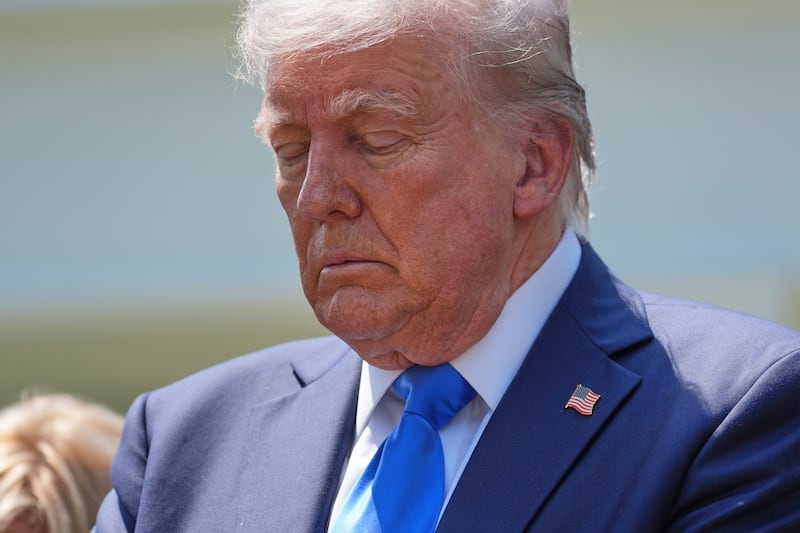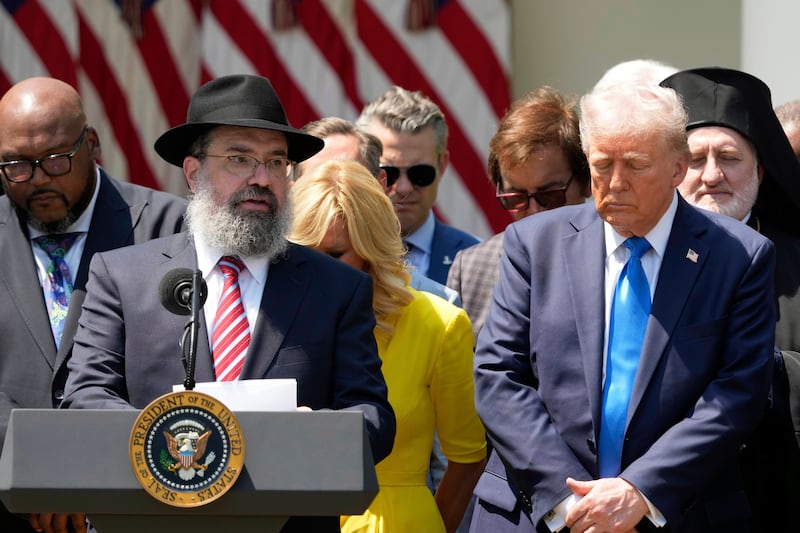President Donald Trump signed an executive order Thursday morning establishing a presidential commission on religious liberty during a White House Rose Garden event in honor of the National Day of Prayer.
The commission panel will include members like former U.S. housing secretary Ben Carson, TV talk-show host Phil McGraw, and Texas Lt. Gov. Dan Patrick, who will also serve as the chair.
Trump credited Patrick with the idea of creating a religious liberty commission and invited him to the podium to say a few words.
Patrick said he believes the Biden administration “attacked people of faith for four years.”
“There’s a saying that no one should get between a doctor and a patient. I think we would say no one should get between God and a believer,” Patrick said.
What‘s the Religious Liberty Commission
Patrick said he felt “a little overwhelmed” about leading the 14-member commission made up of religious leaders and legal experts.
“I feel like a pair of brown shoes in a room full of tuxedos, if you want to know,” said the Texas lieutenant governor, noting the “high caliber, the foremost faith leaders, scholars, thinkers that you’ve put together” that make up the panel.

Ryan T. Anderson, the president of the Ethics and Public Policy Center, in a post thanked Trump for appointing him to the commission. “Wonderful to be at the Rose Garden today and catch up with old friends and my rabbis,” wrote Anderson, the author of “When Harry Became Sally: Responding to the Transgender Moment,” which was formerly banned by mainstream book retailers including Amazon. He attached a picture of his reserved seat at the event.
According to the White House, the religious liberty commission will produce a report on the state of religious liberty in the U.S., and ways to strengthen religious pluralism for present and future generations.
The key areas it will focus on include “parental rights in religious education, school choice, conscience protections, attacks on houses of worship, free speech for religious entities, and institutional autonomy.”
Trump on the separation of church and state
The president signed the order after making remarks and prayers led by religious leaders from the Jewish, Christian and Muslim faiths as well as House Speaker Mike Johnson, known for his strong Christian faith.
“People of faith have never been allowed in the White House,” Trump claimed, occasionally reading from his prepared statement and often going off script.
The president also seemed to downplay the principle of separation of church and state, which safeguards religious freedom and pluralism, but has, at times, been used to try to keep religion entirely out of the public square.
The Constitution prohibits the government from establishing an official religion. But Trump said his White House was open to his churchgoing base.
“They said, ‘Really, there’s separation.’ I don’t know. Is that a good thing or a bad thing? I’m not sure, but whether there’s separation or not, you guys are in the White House where you should be, and you’re representing our country, and we’re bringing religion back to our country, and it‘s a big deal,” he said.
The president also wagged his finger at Democrats and former President Joe Biden and repeatedly claimed the 2020 election was rigged.
Trump presidency to observe historic events
As Speaker Johnson said in his remarks, the National Day of Prayer was established after the Rev. Billy Graham led 40,000 Americans to the Capitol and filed a petition with Congress in 1952.
But the first national call for prayer came in 1775 — a year before the Declaration of Independence was signed — and this year marks 250 years since. Trump said he was pleased to be in office to celebrate the anniversary as well as observe the 2026 FIFA World Cup and the 2028 Olympics, hosted by the U.S.
“We’re going to always bring God with us,” Trump said. “In a letter to wife, Abigail, John Adams wrote of his first National Day of Prayer, ‘Millions will be upon their knees at once before their great creator, imploring His forgiveness and blessing and asking for His favor on the American cause.’”
Two and a half centuries later, Trump said, “God answered other prayers because he’s put in an administration to run this country that‘s going to make you proud again. It‘s going to make you believe and believe more again.”
Trump’s White House Faith Office
In the last 100 days, the Trump administration established a White House Faith Office in the West Wing and launched a Task Force to Eradicate Anti-Christian Bias, aimed at identifying “any unlawful anti-Christian policies, practices or conduct across the government.” His office is also attempting to combat antisemitism on college campuses since Hamas’ Oct. 7, 2023, attack on Israel.
Paula White, the head of the White House faith office, led the attendees in prayer.
“Prayer is not a religious act. It‘s a national necessity,” she said. “Under President Donald Trump’s leadership, faith has not been pushed aside. It has been brought back to where it always belongs.”
White said Trump’s presidency marks an “end to the weaponization of government against people of faith,” including parents, pro-life advocates and traditional Catholics that were “spied on by the FBI.”
More than 1,000 faith leaders have visited the White House in the first 100 days of Trump’s presidency, White said.
“We’ve had an iftar dinner, a Passover and Easter,” she said. “And they’re not here for ceremony but they’re here for collaboration, creating and crafting policy and sharing their hearts.”
“We call for a spiritual reset in our nation, a return to what is right, a reverence for what is sacred, a real alignment with your divine purpose,” White said during her prayer.
Here are the 14 members of the commission:
- Texas Lt. Gov. Dan Patrick, chair.
- Dr. Ben Carson, former secretary of Housing and Urban Development, vice chair
- Ryan T. Anderson, president of the Ethics and Public Policy Center.
- Bishop Robert Barron, who serves the Diocese of Winona-Rochester in Minnesota .
- Carrie Prejean Boller, author and former Miss California USA.
- Cardinal Timothy Dolan, the archbishop of New York.
- Pastor Franklin Graham, president and CEO of the Billy Graham Evangelistic Association and Samaritan’s Purse.
- Allyson Ho, partner at Gibson, Dunn & Crutcher.
- Phil McGraw, TV host and author.
- Eric Metaxas, writer, speaker and radio host.
- Kelly Shackelford, president and CEO of First Liberty Institute.
- Rabbi Meir Soloveichik, rabbi of Congregation Shearith Israel.
- Pastor Paula White, senior adviser to the White House Faith Office.


